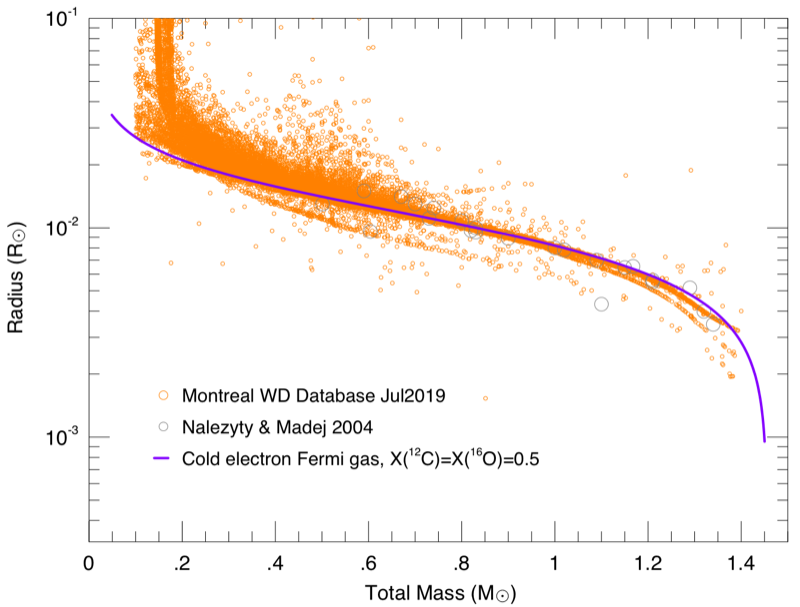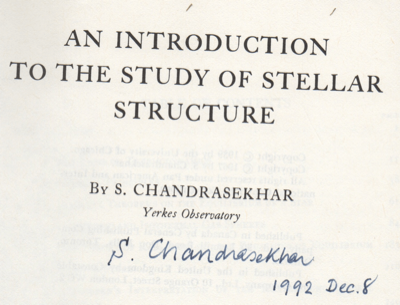
|
Cococubed.com
|
| Cold White Dwarfs |
Home
Astronomy Research
2025 Neutrinos From De-excitation
Radiative Opacity
2024 Neutrino Emission from Stars
2023 White Dwarfs & 12C(α,γ)16O
2023 MESA VI
2022 Earendel, A Highly Magnified Star
2022 Black Hole Mass Spectrum
2021 Skye Equation of State
2021 White Dwarf Pulsations & 22Ne
Software Instruments
Stellar equation of states
EOS with ionization
EOS for supernovae
Chemical potentials
Stellar atmospheres
Voigt Function
Jeans escape
Polytropic stars
Cold white dwarfs
Adiabatic white dwarfs
Cold neutron stars
Stellar opacities
Neutrino energy loss rates
Ephemeris routines
Fermi-Dirac functions
Polyhedra volume
Plane - cube intersection
Coating an ellipsoid
Nuclear reaction networks
Nuclear statistical equilibrium
Laminar deflagrations
CJ detonations
ZND detonations
Fitting to conic sections
Unusual linear algebra
Derivatives on uneven grids
Pentadiagonal solver
Quadratics, Cubics, Quartics
Supernova light curves
Exact Riemann solutions
1D PPM hydrodynamics
Hydrodynamic test cases
Galactic chemical evolution
Universal two-body problem
Circular and elliptical 3 body
The pendulum
Phyllotaxis
MESA
MESA-Web
FLASH
Zingale's software
Brown's dStar
GR1D code
Iliadis' STARLIB database
Herwig's NuGRID
Meyer's NetNuc
AAS Journals
2025 AAS YouTube
2025 Listing of 500+ Author Videos
2025 AAS Peer Review Workshops
2025 ASU Energy in Everyday Life
2025 MESA Classroom
Other Stuff:
Bicycle Adventures
Illustrations
Presentations
Contact: F.X.Timmes
my one page vitae,
full vitae,
research statement, and
teaching statement.
The tool in coldwd.tbz generates models of stars in hydrostatic equilibrium with a cold electron Fermi gas equation of state: \begin{equation} \begin{split} x & = \left [ \dfrac{3}{8 \pi} \left ( \dfrac{h}{m_ec}\right )^3 N_A Y_e \rho \right ]^{1/3} \\ f(x) & = x (x^2 + 1)^{1/2}(2x^2 - 3) + 3\ln(x + (x^2 + 1)^{1/2}) \\ g(x) & = 8x^3 \left [ (x^2 + 1)^{1/2} -1) \right ] - f(x) \\ P_e & = \dfrac{\pi m_e^4 c^5}{3 h^3} \cdot f(x) \hskip 1.0in E_e = \dfrac{\pi m_e^4 c^5}{3 h^3} \cdot g(x) \end{split} \label{eq1} \tag{1} \end{equation} The derivatives of the pressure and energy with respct to the density are also returned by the equation of state module. A general relativistic Tolman-Oppenheimer-Volkoff (TOV) correction to the equation for hydrostatic equilibrium is avaliable as an option. A quote from Icko Iben about generating white dwarf models comes to mind ...
The equations above suffer a catastrophic loss of numerical precision for x ≪ 1 due to the subtraction of two nearly equal terms. These expansions are used instead \begin{equation} \begin{split} f(x) & = \frac{8}{5} x^5 - \frac{4}{7} x^7 + \frac{1}{3} x^9 - \frac{5}{22} x^{11} + \frac{35}{208} x^{13} - \frac{21}{160} x^{15} + \frac{231}{2176} x^{17} + \mathcal{O}(x^{19}) \\ g(x) & = \frac{12}{5} x^5 - \frac{3}{7} x^7 + \frac{1}{6} x^9 - \frac{15}{176} x^{11} + \frac{21}{416} x^{13} - \frac{21}{640} x^{15} + \frac{99}{4352} x^{17} + \mathcal{O}(x^{19}) \ . \end{split} \label{eq2} \tag{2} \end{equation}
The first plot below shows the central density vs mass relationship between a cold electron Fermi gas equation of state and a polytropic equation of state.
A cold electron Fermi gas at low central densities (x ≪ 1) approaches the well-known nonrelativistic form $P = 1.004 \times 10^{13} \ (Y_e \rho)^{5/3} \ {\rm erg} \ {\rm cm}^{-3}$, as can be seen by the leading order $x^5$ series expansion term for f(x) above. In this limit the electrons are well approximated by a n = 3/2, γ = 1 + 1 /n = 5/3 polytropic equation of state.
A cold electron Fermi gas at high central densities (x ≫ 1) approaches the relativistic form $P = 1.2435 \times 10^{15} \ (Y_e \rho)^{4/3} \ {\rm erg} \ {\rm cm}^{-3}$; expansions in this limit are in the source code for reference but are not used as they are not needed. In this limit the electrons are well approximated by a n = 3 γ = 1 + 1 /n = 4/3 polytropic equation of state – the celebrated Chandrasekhar limit.




|
It was a good day. Chicago. 2nd floor LASR. One in an impeccable brown suit and the other in blue overalls, white t-shirt, and Sear's DieHard steel-toe black shoes. |